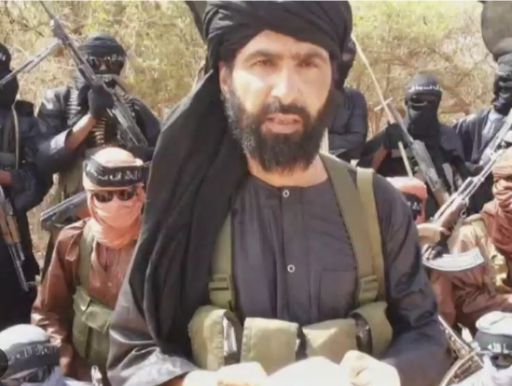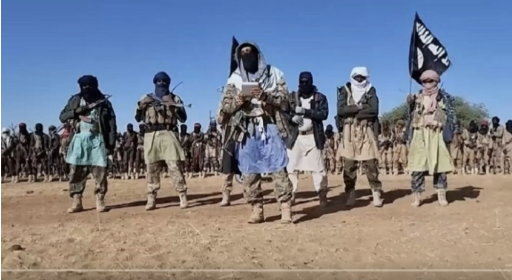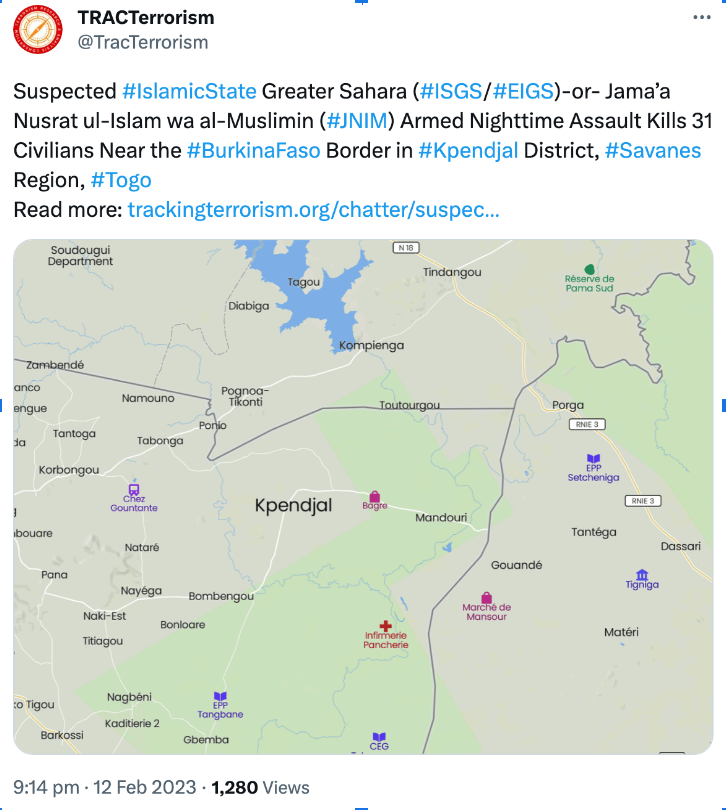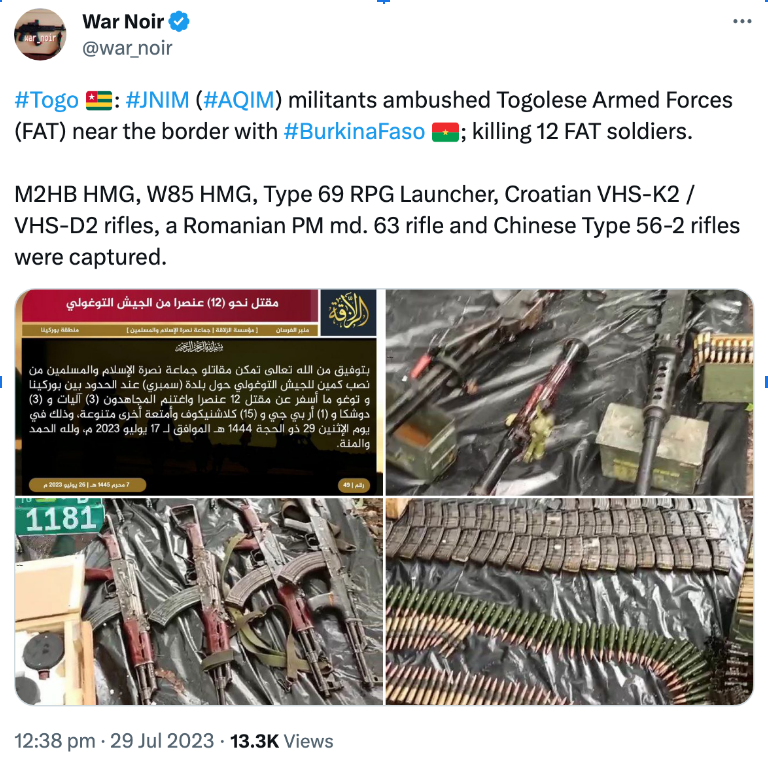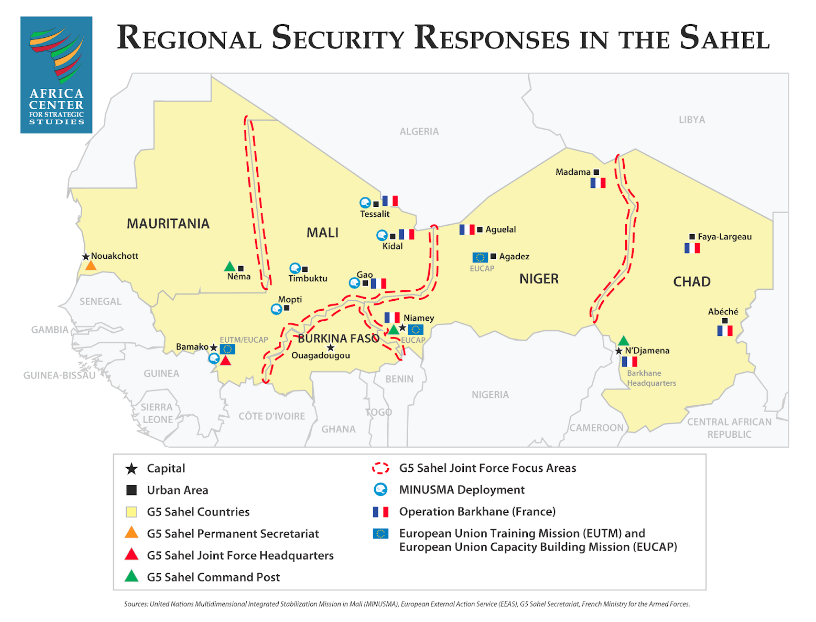Intelligence Report - Burkina Faso: Security Trends and Future Prospects in the Sahel Region
By: Annabelle Gouache, Erlend Hokholt and Vanina Meyer
Summary
The Sahel, particularly Burkina Faso, confronts a grave crisis marked by escalating terrorism and political instability. This intelligence report will offer an in-depth analysis of the prevailing security dynamics and provide valuable insights into the region's future prospects. A convergence of socio-economic factors, transnational crime, and political upheaval fuels this crisis, manifesting in the rise of militant groups. JNIM and ISGS are prominent among these groups, each pursuing distinct strategies while exploiting local concerns. These two groups alone are responsible for the death of thousands of people in Burkina Faso, and the displacement of more than 1.5 million people between 2015 and 2022.
The region faces complex challenges as foreign actors like France and Russia engage differently in counterterrorism efforts. Additionally, internal governance approaches contribute to escalating conflict and human rights violations. As these dynamics unfold, the Sahel's security landscape is set to deteriorate, further jeopardising political stability and democratic progress.
Roots of violence
The Sahel region, particularly Burkina Faso, finds itself at the heart of a tumultuous landscape characterised by escalating terrorism and instability. This region witnessed more terrorism-related deaths in 2022 than South Asia and the MENA regions combined. Dubbed ‘coup belt’, the Sahel has witnessed 7 coup attempts, the last one being Niger. Burkina Faso ranks second globally in terrorism impact after Afghanistan, reporting 1,135 deaths and 495 injuries in 2022 alone. Four of the deadliest terrorist attacks in the world during the same year took place in Burkina Faso, further underscoring the severity of the situation.
Figure from the Global Terrorism Index 2023 report
Social, economic, and political factors – ranging from violent competition over water, growth of the Salafi-Islam ideology, transnational crime – converge to fuel this crisis, with severe political instability marked by a series of coups since 2021 aggravating the situation. In January 2022, Burkina Faso's Burkinabé army, under Paul-Henri Damiba, ousted President Kabore, triggering a drastic shift in governmental composition. This transition fueled a 23% increase in non-state armed violence. Another coup which occurred in October led by Ibrahim Traoré failed to quell violence. Both coups were justified by the worsening of the security situation in the country and the rise of Islamist violence which doubled between 2019 to 2022 alone. Despite promises of civilian rule, Burkina Faso grapples with ongoing turmoil, with the state only controlling 60% of its territory in 2022.
The army and pro-government militias’ responsibility for perpetrating massacres in Nouna in December 2022, in Ouahigouya in February 2023, and the biggest yet in Karma in April 2023 have also aggravated the crisis. These dynamics have created a breeding ground for militant groups, who capitalise on grievances e.g. perceived corruption among urban elites, marginalisation of minority ethnic groups, and promise of money through drug trafficking. The main groups are Ansar ul Islam, the first native Jihadi group of the country, Al-Qaeda linked “Jama’at Nasr al-Islam wal Muslimin”(JNIM), and IS-affiliated group “Islamic State in the Greater Sahara” (ISGS) (see maps below). As Burkina Faso grapples with these challenges, the fight against terrorism remains intricate and multifaceted.
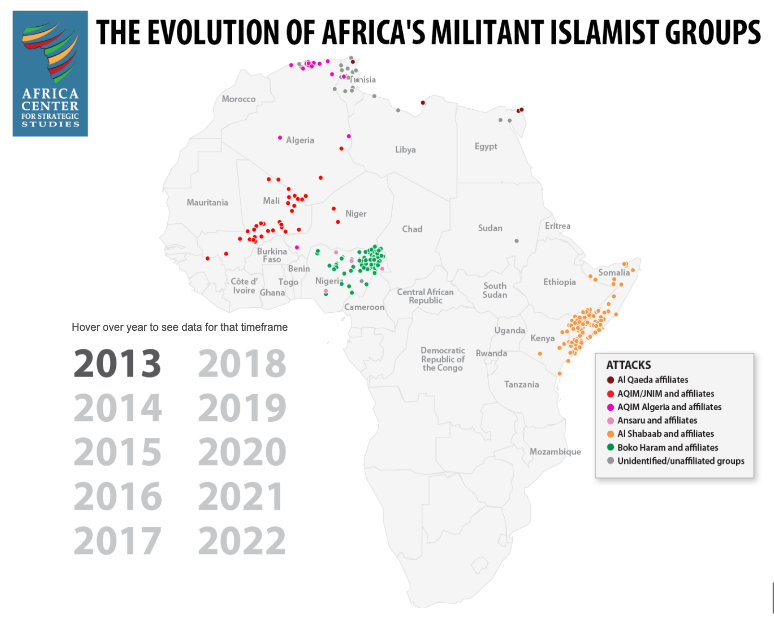
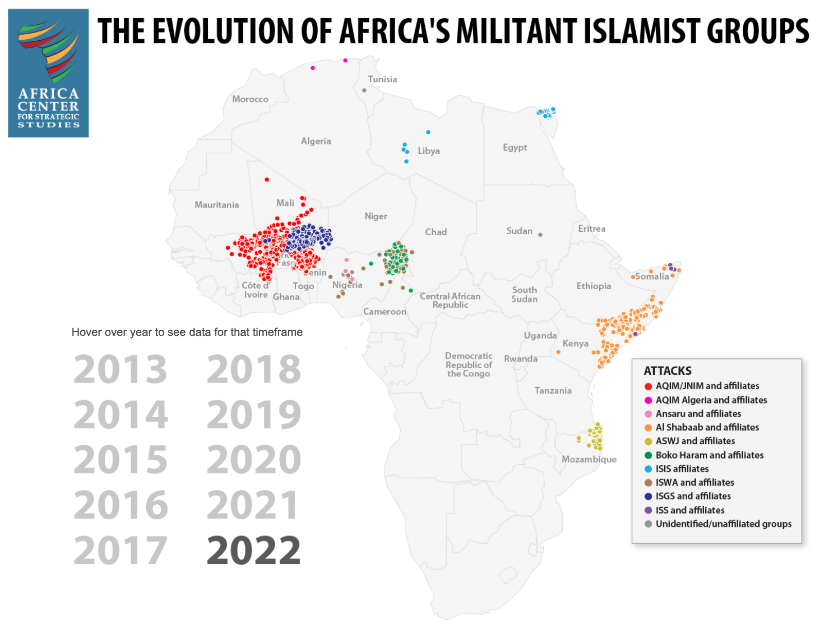
Transnational crime
Organised crime in border areas, particularly in the Liptako-Gourma region previously mentioned, is contributing to terror activities in the Sahel region while providing support to Islamist militant groups. Illicit activities encompass arms trafficking, drug trade, cattle theft, and gold mining, all serving as sources of income and bolstering the groups’ capabilities. Illicit gold mining in eastern Burkina Faso is particularly notable among these activities. This connection between Islamist militant organisations and transnational crime creates livelihoods in territories under group control, establishing links with local communities and aiding recruitment.
Recent intensification and diffusion of violence
Three zones of violent activities can be discerned in Burkina Faso: (1) the frontier provinces that border Mali and Niger, (2) the centre-north provinces, and (3) the southwestern and southeastern provinces that border Ivory Coast and Niger respectively. The three-frontier zone, which shares borders with Mali and Niger, has contained most violence by Islamist militant groups.
Map showing the diffusion and intensity of violence between 2017-2022 in Burkina Faso, Mali, and Niger. African Centre, 2022.
Attributing responsibility for the majority of attacks proves challenging due to a combination of factors. Many of the groups refrain from claiming responsibility, and the presence of multiple sub-groups and fragmented factions often leads to clashes among themselves. These groups also engage in indiscriminate targeting of civilians, aiming to instill fear and exploit resources. As a result, this chaotic environment creates confusion about the responsible parties. The following section delves deeper into the motivations and objectives of the two primary radical militant groups, JNIM and ISGS, which are currently in conflict within Burkina Faso.
Jama'a Nusrat ul-Islam wa al-Muslimin (JNIM)
JNIM is the most prominent terrorist group in Burkina Faso. It was formed in 2017 in the Sahel region of sub-Saharan Africa as a result of a coalition of Salafi-jihadist insurgent groups including the Macina Liberation Front. Based in Mali, their strategy like that of broader Al Qaeda is “to incite Muslims to oppose oppression, expel occupying powers from the Sahel region, and implement Islamic governance” and declared France and its Western allies as its enemy.
They target civilians, local security forces, and counter-terrorism operations such as international militaries and UN peacekeepers. The group funds itself by ransoming captives, taxing locals, smuggling weapons, and extorting human and drug traffickers. They also target critical infrastructures such as water reservoirs and bridges necessary for the provision of food and humanitarian aid. In 2022, out of the total 279 deaths attributed to JNIM, approximately 48% took place in Burkina Faso. The group increased recruitment focusing its narrative on the deteriorating economic and social conditions and discontentment against local governments. They mainly expand among marginalised Fulani communities and rely on a more population-centric approach to gain local support compared to ISGS, known for its brutality.
Counter-terrorism efforts against JNIM have involved France's Operation Barkhane, which was established in 2014. However, since their withdrawal, JNIM expanded its violent activities across the Sahel region.
Photo 1: Iyad Ag Ghaly, also known as Abū al-Faḍl, leader of JNIM since its formation
Photo 2: Attack verified by Bellingcat on a civilian convoy on route to the besieged city of Djibo in Northern Burkina Faso by JNIM
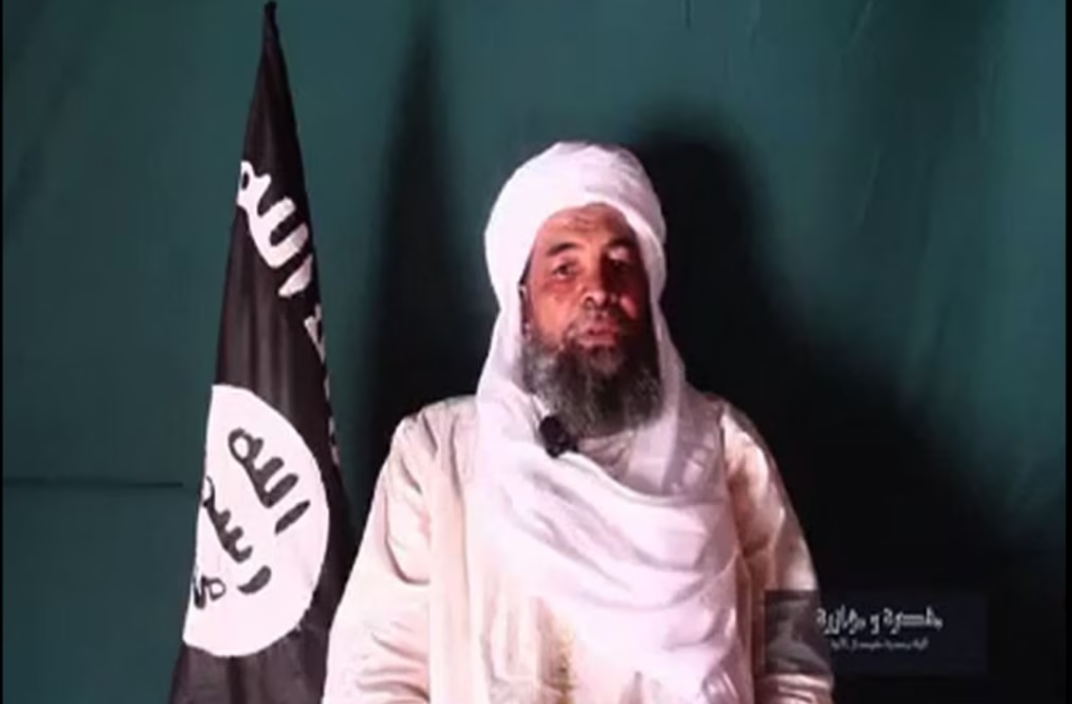
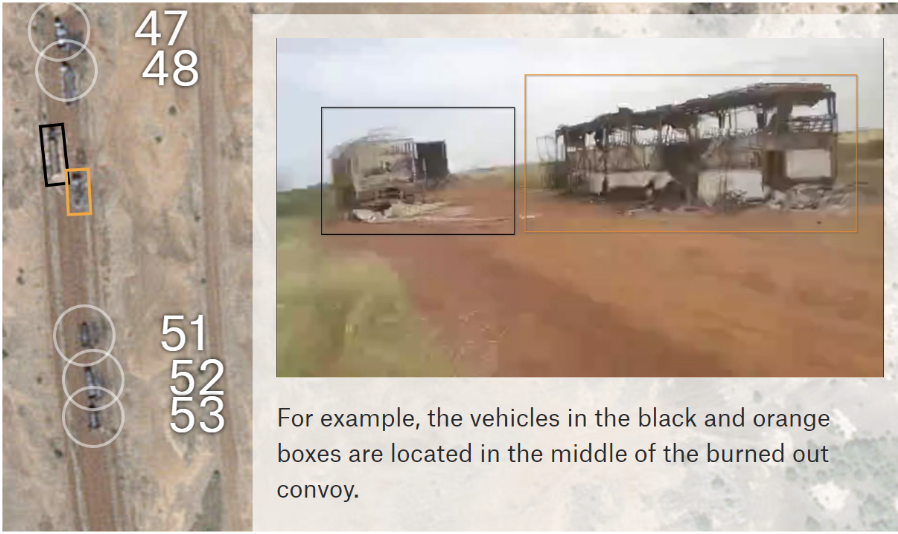
The Islamic State in the Greater Sahara (ISGS)
ISGS is an IS-affiliated Salafi-Jihadist group militant group, an independent subgroup of Islamic State West Africa Province (ISWAP), and is the second most dominant Islamist militant group after JNIM in the Sahel region.
The group traces its origin to mergers and splinters of different Islamist groups operating in the Sahel region in 2011. The forerunner to ISGS is the Movement for Oneness and Jihad in West Africa (MUJAO) which was formed in 2011. In 2013 merged MUJAO together with the other Sahel group Signatories in Blood to form al-Mourabitoun. In 2015, Adnan Abu Walid al-Sahrawi, a senior commander of al-Mourabitoun – the former, defected with his men and pledged allegiance to the Islamic State (IS), giving rise to the ISGS we have today. ISGS’ long-term goal is to establish a Salafi-jihadist caliphate that follows Sharia law and is inspired by IS ideology. The group pursues policies such as the ban of music and amputations of the hands and feet of thieves in ISGS-controlled territory.
The group operates in the border areas between Burkina Faso, Mali, and Niger, and is mostly active in the Liptako-Gourma area, where villages In-Araban, Akabar, and Infoukaretane are important bases for operation. In Burkina Faso, the group exhibits its highest activity in the northern border provinces of Oudalan and Seno. The group attacked both civilian communities and adversaries such as Sahel national militaries, foreign forces, and other Islamist militant groups. ISGS has a history of conducting several massacres against minorities such as the attacks on Mossi, Foulse, Songhai, and Bellah communities. They have also conducted kidnappings and assassinated political rivals, such as the kidnapping of a French schoolteacher and the killing of the mayor of Koutougou for his alleged collaboration with the Burkinabé military. The group's standard tactic is the use of ambushes and swarming tactics through motorcycle and vehicle-borne armed assaults.
ISGS has in the past cooperated with other Islamist militant groups like JNIM initially because of their shared local recruiting pools and ties to communities in the Sahel region, in spite of their global competition as part of IS and al-Qaeda. The two groups have also conducted joint attacks in the past, as evidenced by their collaborative involvement in an August 2019 assault against a Burkinabé military detachment in Koutougou. However, we have now seen more competition and rivalry between the groups. After the French forces withdrew and local military forces were unable to deter the Islamist forces, ISGS began to challenge the former ally and the dominance of al-Qaeda-affiliated JNIM. An offensive in March 2022 was an example of where ISGS conducted a large-scale offensive in the Menaka and Gao regions. ISGS attacked civilians, pro-government Self-Defense forces, and JNIM fighters.
Photo 1: Founding leader of the ISGS, Adnan Abu Walid al-Sahrawi who was killed by French forces in 2021
Photo 2: His predecessor and current leader of ISGS Abu al-Bara al-Sahrawi (Middle) with fighters.
Spillover effects
Domestic level: cycle of local grievances and retaliatory killings among the population
Armed groups operating in Burkina Faso have ignited a cycle of local grievances and retaliatory killings among the population. These armed groups have besieged towns, conducted attacks, and displaced or killed civilians suspected of collaborating with government forces. Local communities are often forced to align with either AQ or IS factions in conflict zones, or support armed forces and militias. This dynamic has triggered the emergence of self-defense efforts by civilians, further escalating violence, particularly across various regions of Burkina Faso and the broader Central Sahel, encompassing Mali and Niger. These militant groups strategically exploit local concerns and grievances, deliberately targeting civilians to fuel inter-communal violence and exacerbate societal divisions.
They exploit existing tensions between agrarian farmers and pastoralists who graze their livestock freely, along with the resentment rural populations hold against the central government. The ultimate aim is to consolidate their authority by fomenting conflicts both within local populations and against the ruling government. The incapacity of government forces to effectively counter these non-state armed actors, partly due to their own instability, has worsened the situation. The reliance on local pro-government militias, which are unable to curb the surge in violence, has led to a cycle of retaliatory killings by local populations, fueled by the continuous violence perpetrated by these armed groups.
Security and Relations Deteriorating for Neighbours
The worsening situation in the Central Sahel is slowly expanding to countries which until now have been spared to some extent by Islamist militant groups. In northern Togo, JNIM launched an attack on February 10 2023 killing dozens of civilians in Tola and Gningou villages, Kpendjal prefecture – their deadliest so far (Tweet 1). On July 17th, 2023, attackers ambushed a military convoy in the same zone resulting in the death of at least 12 soldiers (Tweet 2).
This incident, likely orchestrated by JNIM, triggered the extension of the state of security emergency in the northern Savanes Region along the Burkina Faso border until March 2024 signaling that the group is strengthening its presence in northern Togo. The same incursions are also occurring in northern Benin, northern Côte d’Ivoire, Ghana.
Worsening of Relations with ECOWAS and Military Partners
The escalation of jihadist groups' influence across the broader region has coincided with a shifting political landscape marked by increased alignment between the junta-led governments of Mali and Burkina Faso (and now Niger), bolstered by support from external actors, namely Russia. This alignment has not only further complicated the security dynamics but has also led to strained relations between these nations and the Economic Community of West African States (ECOWAS). In response to these shifts, ECOWAS has imposed sanctions on the military-led governments, reflecting its strong stance against the disruption of democratic norms and the consolidation of military power.
France's historical engagement in the Sahel region, marked by military operations aimed at stability, has experienced challenges. The French troops were working with the G5 Sahel, a regional multinational military collaboration between Burkina Faso, Chad, Mali, Mauritania, and Niger. The organisation was also supported by the US and the EU for training, equipment, and logistical assistance (map below).
Areas of operation of Barkhane and other forces deployed to address insecurity in the Sahel. Africa Center for Strategic Studies
The coup d’état in May 2021 in Mali and difficulties in collaborating with national governments prompted France to announce the gradual withdrawal of its troops. France shifted its focus to providing advisory support to regional forces. Burkina Faso terminated its military arrangement with French special forces in February 2023, seeking closer alignment with other partners, notably Russia.
As part of Russia’s "ambiguous warfare" military strategy, Wagner Group has established a presence in Mali and other African countries, raising concerns about Russia's increasing influence in the region. Notably, the deteriorating relations between France and African countries in the Sahel region are partly attributed to Russian disinformation campaigns. These campaigns utilise popular social networks and media platforms like Facebook, Twitter, Telegram, and TikTok, as well as the involvement of Wagner group mercenaries, to spread pro-Russian sentiments among the local population. Burkina Faso's transitional leadership has faced pressure from protesters to establish closer ties with Moscow, signaling a shift in geopolitical dynamics. Yevgeny Prigozhin, the leader of the Wagner Group had praised the coup leaders, but analysts are sceptical about the group's effectiveness given the deteriorating security situation in Mali since Wagner's involvement.
Humanitarian consequences
According to UN-partnered humanitarian assessment reports, the Central Sahel region highlights that 34 million individuals out of the 109 million based in the region are in need of humanitarian assistance. Displacement due to violence, persecution, and human rights violations has affected around 6.6 million people as of 2023. Notably, approximately 75% of these displacements are attributed to threats and attacks by non-state militant groups. Tensions from this displacement have arisen in Ghana, where the government expelled Burkinabe refugees, primarily Fulani women and children. This action was criticised by UNHCR and sparked an unofficial audio recording from JNIM last month calling for jihad against Ghana if perceived abuses against Fulanis continue.
Forecast
Islamist groups
With the withdrawal of French troops from Burkina Faso, the roles of JNIM and IS Sahel are poised to become increasingly significant, as both factions compete for influence, fueling a vicious cycle of violence in the region. This map summarises the expansion of both groups in the region during the first half of 2023.
Whether the response to the jihadist insurgency relies on citizen militias or the involvement of Wagner mercenaries, it is highly likely that the region will witness a heightening of conflicts in the upcoming year, especially, in the centre north where there are significant gold deposits. Other zones likely to witness more violence are the southeast of Burkina Faso in the border regions between Niger, Benin, and Togo and the southwest alongside the bordering regions to Mali and Côte d'Ivoire.
Foreign actors involvement
The growing anti-French sentiments and breakup of the French lead counter-terrorism alliance together with three coups in a short period of time contributed to political instability. The deteriorating relationship with France and its Western allies opened up for Russian influence and notably a greater reliance and presence of the Wagner group in the country. This can also contribute to potential future sanctions on Burkina Faso from Western partners because of the closer ties to Russia and the Wagner group. The US has already paused 450 million dollars in aid to the country after the coup in 2022 and has expressed concern about the emerging direction.
Tensions between ECOWAS and the juntas of the regions have further escalated following the coup in Niger last month. Most of the 15 ECOWAS member states have pledged to participate in a possible military intervention to restore democracy in Niger, with the exception of Cape Verde and the military-led countries i.e., Mali, Burkina Faso, and Guinea. Mali and Burkina Faso deployed two Super Tucano fighter jets to Niger’s border as a sign of support to Niger in case of a military intervention. Diplomatic discussions are underway to avoid such an outcome, but it is clear that military action would significantly destabilise the region and encourage the expansion of Islamist groups in the area. France and the US have halted counter-terrorism operations in the country. On August 15h, insurgents killed 17 soldiers and wounded dozens in Koutougou near the border with Mali and Burkina Faso. JNIM claimed responsibility for the attack. This was the first major attack on the Nigerien army in half a year, reinforcing fears that the JNIM and ISGS are competing to assert their power in rural Niger, while the junta attempts to establish its authority in the capital and in the international community.
After the Wagner group's failed mutiny in June, it remains to be seen how strong Wagner's presence will be though it has been hinted that more Wagner troops will arrive in Africa. Similarly, President Traoré has heavily fueled anti-French and pro-Russian sentiments and has asked for sales of arms, training, equipment, and logistical assistance from the Kremlin. However, he has distanced itself from the speculation that it will employ Wagner mercenaries like its neighbour Mali. The Burkinabè head-of-state has instead claimed that it will rely on its own population and hopes to raise "its own Wagner force” against the jihadis through the recruitment and arming of volunteer fighters.
Domestic governance
President Traoré populist approach of arming civilians through mass mobilisation and volunteer programs will likely contribute to escalating the conflict. There were reported 132 violent incidents conducted against civilians in the month of May this year. The state-sanctioned violence from government forces and militias will likely escalate the ongoing attacks and retaliation. As observations support, we have in recent months seen a noticeable increase in acts of mass atrocities perpetrated by militants, volunteer fighters, as well as military and security forces, accompanied by a surge in extrajudicial killings. This will likely escalate the conflict and push the country further into a deeper crisis with a worsening of human rights abuses at the hands of both pro-government and Islamist groups.
Overall, the security landscape is likely to experience a deterioration, both domestically and regionally, leading to diminished political stability. The continuing instability and authoritarian leadership will also further regress the democratic progress in the country.



